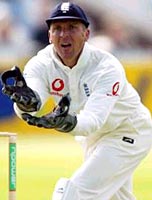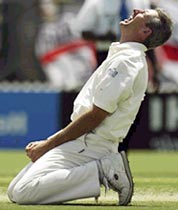

England must drop the aged and ordinary
A tour to Australia provides a team and its players an opportunity to assess their standing in the game. It is the litmus test of the modern cricketer. Only top-class performers and raw rookies can hope to survive. A study of nature confirms the point.
Eucalyptus, the stoical gum tree, dominates the landscape and kangaroos hop around the parched hinterland. Such flowers that survive are bright and even the parrots are noisy. The same applies on sporting fields across the continent. It is the survival of the toughest.
Batting is hard against this Australian machine. No shame lies in failure. Amongst batsmen still playing, only Sachin Tendulkar, Brian Lara, Gary Kirsten and Graham Thorpe average over 40 in the antipodes.
 Tendulkar arrived as a teenager and left as a man with two memorable hundreds to his name. Brian Lara dazzled in Sydney and, years later, in Adelaide. Thorpe tops the averages for the last decade with 48 an innings.
Tendulkar arrived as a teenager and left as a man with two memorable hundreds to his name. Brian Lara dazzled in Sydney and, years later, in Adelaide. Thorpe tops the averages for the last decade with 48 an innings.
By the end of a challenging series in this neck of the woods, England will be better placed to name its line-up for the next few years.
By then the aged will have been given their cards and strugglers will have been exposed, leaving room for the committed to prove their worth.
Only the strong will be left standing. No-one need fear the challenge. Youngsters with the stomach for a fight will be excited by the pace and aggression of the Australian game and will return much the wiser. Tough experiences make or break a player. If the first eight days of the series are anything to go by, England's older players will not last much longer.
Every team looks towards its senior players at the start of a series against a formidable opponent. England has brought several novices and injury has taken a toll of an
already threadbare attack.
Accordingly, Nasser Hussain and his advisors are relying on Andrew Caddick to give the bowling its cutting edge. Unfortunately the angular pace bowler has not responded to the challenge. To the contrary his new ball spells have been ragged, which has set the tone for the rest of the innings. With his height, bounce and ability to sustain long spells, Caddick is suited to operating on these hard pitches and leaving him behind on the previous Ashes tour had been a mistake. Here he has a wonderful chance to pit himself against the best practitioners around.
Unfortunately Caddick has bowled without the control or aggression needed by his team. Pressure has been his undoing. Certainly he has not shown the relish for a fight detected in less-favoured colleagues. Before it is too late he must grab the ball and change a match. Otherwise he will be dropped. Likewise, Alex Tudor must prove that he has the capacity to perform consistently.
Tudor bowled timidly in Hobart and England cannot wait much longer for him to mature. Teams are brought down by those promising riches tomorrow, because tomorrow never comes.
Caddick has bowled without penetration and has been carted around the park. For his crucial opening burst in Adelaide, an unusual field was set with several men placed to intercept the drive. Rather than executing the tactic, England's senior bowler dropped short and within
a few minutes the horse had bolted. Caddick's batting also told a tale of a player in disarray.
Having had the nerve to call-up Steve Harmison and Simon Jones, the selectors must go further by replacing old hands and backing these fellows as well as Anderson of Lancashire.
Alec Stewart's long career is also approaching its end. Admittedly this canny customer has been written off more times than Cliff Richard but his reflexes are slowing and his batting is in decline.
Stewart will not go down without a fight. Like the current Australian captain, he is a determined man and a proud competitor.
 Nor is it any use waiting for players to retire unprompted because few men walk away from fame and fortune. Stewart's supporters point out that he occupies two positions in the side and that no obvious replacement has been found. But it is neither wise nor healthy to allow a player to prolong a career beyond his peak.
Nor is it any use waiting for players to retire unprompted because few men walk away from fame and fortune. Stewart's supporters point out that he occupies two positions in the side and that no obvious replacement has been found. But it is neither wise nor healthy to allow a player to prolong a career beyond his peak.
Stewart averages 25 in these parts and has entered his fifth decade. Teams cannot be built around yesterday's men. After this tour, and
barring a revival, Stewart must be honoured and dispatched. Ruthlessness is needed in high places.
Until he took a flurry of wickets in the Australian innings, Craig White did not look quite lively
enough with bat or ball. A limited range of shots and an inability to swing the new ball counted against him. By disrupting the Australian middle-order White has demanded further opportunities and
the last three matches will be his testing ground. He is highly regarded in
Melbourne, where he played Grade cricket. England's tactic of playing lots of all-rounders is not without merit provided they can reach the standard in one of the disciplines.
Despite sundry disappointments, England can take heart from the spirit shown by its newcomers. As far as spin goes Richard Dawson is a novice but he loves the game, wants to learn and is more likely to beat the outside edge than Ashley Giles. Simon Jones impressed the Australians in his brief visit and Harmison has a sound action and long legs.
England cannot expect both to survive the hazardous journey from promise to fulfillment but it was right to bring them along. As Matthew
Hoggard's figures confirm, trajectory is important Down Under. Bowlers must hit the pitch hard. Robert Key's effort in Hobart confirmed that he has the makings of a proper batsman.
With Hussain approaching the end of his career and Graeme Thorpe taking stock of his life it is up to him and his contemporaries to carry the batting. It takes a long time to become a Test batsmen. None of the
current Australians had an easy time of it and they are a talented lot.
Damien Martyn, Justin Langer and Matt Hayden did not take their first
opportunities well enough to satisfy the selectors and were sent back to State cricket to master their craft. Nothing is inevitable in
this or any other game. Key and chums must work hard and expose themselves to gruelling experiences to tighten their games.
Realising he was weak against spin, Hayden paid his way to India.
Regardless of the result of this series England can take a lot home from this tour, not least the way the game is run and regarded.
Past players play an enormous part in the Australian game. They are an impressive bunch and England recent champions shrivel beside them. Not nearly enough credit has been given to former players like Allan Border and David Boon, and not nearly enough blame has been attached to English heroes still parading around and unable to recognise their part in the decline and fall.
Recriminations will be a waste of time, though those responsible for the treatment of Darren Gough and Andrew Flintoff should be replaced. Otherwise, it is a matter of respecting the Australians and concentrating upon building a team around Michael Vaughan, Marcus
Trescothick and comrades capable of sustaining a long career in this company. England must drop the aged, eject the ordinary and shown faith in carefully chosen players with the mental, physical and technical skills required to prosper Down Under next time around. Above all, England must not be distracted by victories in one-day cricket or performances against opponents unworthy of Test status.
The Ashes is the main game; the little urn still primly kept in its London hideaway, the battle against an old foe that has been beaten before and must be beaten again. Australia has become the yardstick and England must not flinch from its challenge or its truths.
The story of the Ashes - Mohandas Menon
More Columns
Mail Peter Roebuck